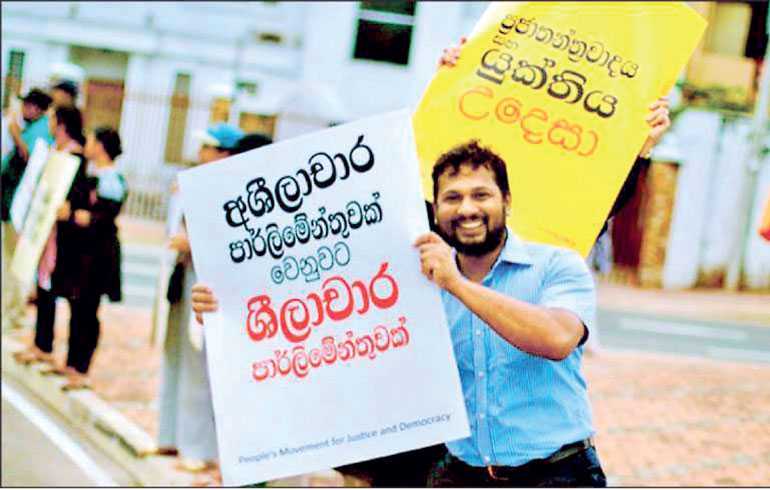Saturday Feb 21, 2026
Saturday Feb 21, 2026
Wednesday, 2 September 2020 00:00 - - {{hitsCtrl.values.hits}}

Hejaaz Hizbullah
I do not know Hejaaz Hizbullah. I have come to know of him from the several accounts published in the media over the past few months, by a classmate, a contemporary and colleague, a student and a brother. I do not know what pain of mind he must feel, isolated in a cell, without being charged, but accused of a heinous crime by the authorities and judged variously in the careless courts of public opinion. But I do feel pained, for him, for us on this island. This cannot be our lot, in this age, at this time. We cannot settle for such a future, for any of us. 
I do not know why he chose to become a lawyer. From what I hear, he was extremely good at his job, ending up a Supreme Court lawyer at a young age. I do know what it is to want to study law, because that was my dream too, and qualified to do so at university entrance, although my life took a different turn. Despite all the failures, delays and shortcomings of the legal system, young people still aspire to practice law, and people still want to believe in the justice system, and hope against hope that it broadly works.
I do not know of his alleged association with the perpetrators of the Easter bombings. I do know that after that fateful day in April 2019, things were never the same for many people. I was in Moscow, but distance didn’t make much difference. Russians cried, and young people came in groups to place flowers outside the Embassy, hanging around the Buddha statue at the front of the Embassy in disbelief, lit candles, prayed. Eight purple-robed Bishops conducted the service we requested for the victims at the Catholic Cathedral in Moscow, and unprecedentedly, the Church was filled with the diplomatic corps.
I do not know what motivated him to be an activist who helped people with various issues. I do know that his schoolmates and colleagues and students were impressed by his sincerity and dedication, because he seemed to have shown early signs that he cared about people. Those who knew him seem to be stunned that he should be involved in anything as mindlessly evil and brutal as a massacre of worshippers.
I do not know why the suicide-bombers chose Catholic worshippers in church on Easter, to carry out their carnage. I do know that there was no history of animosity, conflict or any kind of ill-feeling between Muslims and Christians of any denomination, on this island, which had seen plenty of violence of many sorts, including ethnic and religious, in its long history. As such, this was a shock and all the explanations and speculations by the confused don’t really make sense.
I do not know who his clients were as a lawyer. I do know that lawyers defend all sorts of criminals, because they are considered innocent until proven guilty. This is the only guarantee that we as citizens have of getting representation in a court of law, if by some unfortunate turn of fate one is accused of some crime one did not commit. It is a lawyer who can ensure the protection of the law to those unfamiliar with the legal arguments, as most of us are, and justice for the innocent.
I do not know why the authorities haven’t charged him. I do know that what he is accused of is to do with an involvement in a crime so heinous that in this country, it has been paralleled only by the Tigers killing worshippers at Anuradhapura (1985) and Kattankudy (1990). There is something particularly sickening in killing worshippers at a shrine, whatever the cause that set the killers on a path of violence.
I do not know how many others are in the same plight, incarcerated without adequate evidence for the purported crime, not properly charged, bewildered at their sudden removal away from their families, from everyday life, and not knowing how long the nightmare would last. I do know, only second hand, the feeling of utter horror and despair of such a fate as the pages of a novel by Kafka came alive for me.
I do not know how long it will take to bring justice to the innocent victims of the Easter bombings. I do know that Malcom Cardinal Ranjith has been urging it upon the Government; this one, and the previous one. It is his flock that faced the horror of seeing their loved ones blown to pieces, the blood-splattered image of the risen Christ against the backdrop of utter destruction inside the Kochchikade Church becoming the unforgettable symbol globally, of that utterly inexplicable avalanche of terror upon Easter worshippers.
I do not know if the authorities will ever be able to bring closure to those who are left behind, those who suffer every day, the loss of their loved ones. The problem with suicide-bombers is also that some of the evidence dies with them. I do know that there were many mistakes made in failing to prevent such a shocking event, that governments changed as the voters gave their verdict.
I do not know if the inquiries will yield proper results or if it’s even possible. I do know that even if nothing comes of the inquiries anytime soon, there is something that a government can do, so as not to make things worse for the people. And that is not to pour vinegar on the wound. Every day that an innocent person suffers in prison without charge while the authorities scramble for evidence, and as days turn into months, the collective wounds of those left behind looking for answers, are renewed and their insecurities are redoubled. It begins to look like someone is being made a scapegoat because there is not much else the authorities can do.
I do not know if anyone’s listening. But I do know that people are speaking. They want peace. They want to know they are safe. They want to know that the right people are punished, but that there are no more innocent victims of a tragedy already too horrific to forget. Nobody asks for a show trial to appease the calls for justice, where yet another innocent life, and those of his family are ruined. That is not justice for the victims of the Easter bombings. But for the grace of God, it may well have been their lives, their families. People want to know that the authorities can be trusted to release those who may be innocent, if no evidence is available to prove the contrary. They, “would not condemn the innocent”.
Blessed are those who are merciful.